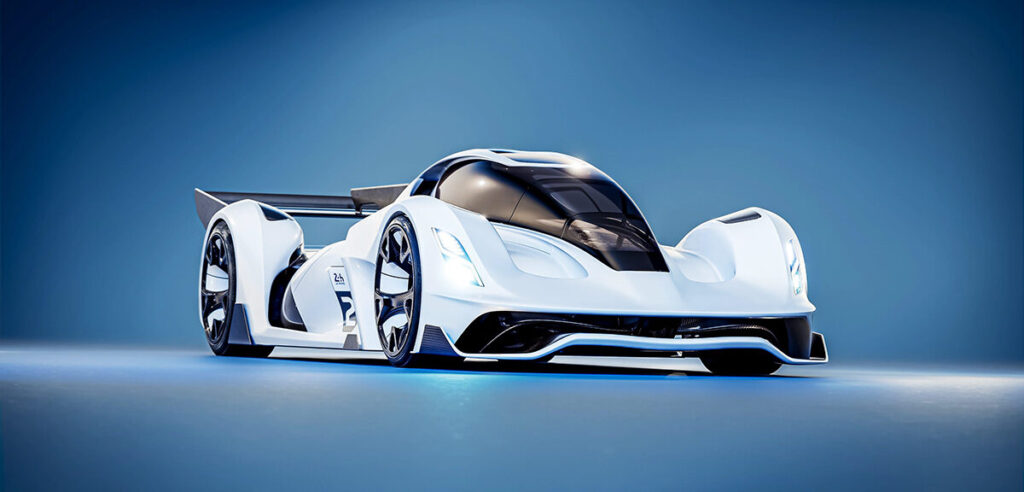
The ACO has provided details on the MissionH24 prototype’s upcoming development in an endeavor to run an FCEV class at the Le Mans 24 Hours in 2026. A prototype built on the LMP3 platform has so far competed in a few Michelin Le Mans Cup races.
The next generation fuel cell from fuel cell supplier Symbio, which employs several stacks, will be installed in the new prototype. Its power density is expected to be 50% higher than that of the present model and will produce 300kW.
While You Care for Your Car, Care for Your Child’s Future Too 💖
A fun and educational book every parent should gift their kid.
 Get Kiddy Store Fortune Now
Get Kiddy Store Fortune Now
The H2 storage systems were created, manufactured, and installed in the vehicle by Plastic Omnium, a company that is collaborating with the ACO. The two tanks have an installed weight of about 100 kg and a combined hydrogen storage capacity of 7.8 kg (3.9 kg x 2). With this fuel load, you should have a running period of 25 to 30 minutes between refuels.
The infrastructure being created in collaboration with TotalEnergies for the H2 class at the Le Mans 24 Hours will allow the automobile to refuel. Additionally, a buffer battery system with a 400kW maximum output will be utilized, allowing for the utilization of both the fuel cell and regenerative braking.
The ACO has indicated a power density of 20kW/kg, with a total weight of 30kg, and the fuel cell and battery will feed a single electric motor with a peak output of 650kW will drive the back wheels (the current car has two motors). Drive will be transmitted using a mechanical LSD and a single speed reduction transmission.
The ACO estimates that the car’s intended speed should put it in the lead of the GT field, and the first circuit tests are planned for early 2025. The car will weigh 1,300 kg.
FAQ’s(Frequently asked questions)
Q: What is MissionH24?
A: MissionH24 is a new racing series that will feature hydrogen-powered vehicles competing in a 24-hour race. The series is being organized by the Automobile Club de l’Ouest (ACO), which also organizes the 24 Hours of Le Mans race.
Q: When will MissionH24 take place?
A: The first MissionH24 race is scheduled to take place in 2025.
Q: Where will MissionH24 take place?
A: The location of the first MissionH24 race has not yet been announced. However, it is likely that the race will be held at a circuit that is already familiar to ACO, such as Le Mans or Spa-Francorchamps.
Q: What types of vehicles will compete in MissionH24?
A: MissionH24 is open to a variety of hydrogen-powered vehicles, including prototypes, sports cars, and GT cars.
Q: Why is MissionH24 important?
A: MissionH24 is important because it is a showcase for the potential of hydrogen power in motorsport. Hydrogen is a clean and renewable fuel, and it has the potential to reduce emissions from racing cars.
Q: What are the goals of MissionH24?
A: The goals of MissionH24 are to:
- Promote the development and use of hydrogen-powered vehicles in motorsport.
- Raise awareness of the benefits of hydrogen power, such as its low emissions and sustainability.
- Provide a platform for manufacturers and teams to develop and test new hydrogen-powered racing technologies.
Q: What challenges do hydrogen-powered racing cars face?
A: Hydrogen-powered racing cars face a number of challenges, including:
- Hydrogen is a low-energy-density fuel, which means that hydrogen-powered cars need to carry more fuel than gasoline-powered cars.
- Hydrogen refueling infrastructure is still limited, which can make it difficult for hydrogen-powered cars to compete in long-distance races.
- The cost of hydrogen-powered racing technology is still relatively high.
Q: How is ACO addressing the challenges facing hydrogen-powered racing cars?
A: ACO is addressing the challenges facing hydrogen-powered racing cars by:
- Offering financial and technical support to manufacturers and teams that are developing hydrogen-powered racing vehicles.
- Working with governments and other stakeholders to develop hydrogen refueling infrastructure.
- Promoting the benefits of hydrogen power to motorsport fans and the general public.
Q: What is the future of hydrogen-powered racing?
A: The future of hydrogen-powered racing is bright. Hydrogen is a clean and sustainable fuel that has the potential to reduce emissions from racing cars. As the cost of hydrogen-powered racing technology decreases and hydrogen refueling infrastructure becomes more widespread, hydrogen-powered racing cars are likely to become more competitive and more popular.

